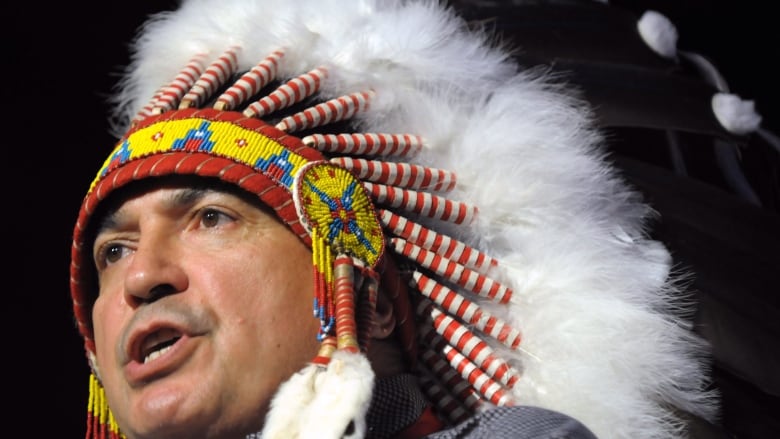AFN gains Native American backing for NAFTA Indigenous chapter
National Chief Perry Bellegarde hopes chapter will be included to protect Indigenous rights

Native American tribal leadership is backing the inclusion of a chapter on Indigenous rights in the final draftof the currently under-negotiation North America Free Trade Agreement, Assembly of First Nations National Chief PerryBellegarde said Tuesday.
The National Congress of American Indianspassed a motion of supportbacking inclusion of a chapter in NAFTA that references the UN Declaration on the Rights of Indigenous Peoples and ensures a final dealdoesn't negatively impact Indigenous rights, saidBellegarde,who spoke to theNCAIannual general assembly Tuesday morning.
"I wanted to be here to enlist their support asNCAI, as chiefs and leadership, to support that concept, so they in turn can demonstrate and show the president of the United States and their team here on the U.S. side that there is support from Indigenous people for that chapter to go forward,"Bellegardesaid in a telephone interview from Milwaukee after speaking to the assembly.
Canada has already stated its support for including the chapter and iscurrentlyengaged in negotiations onNAFTA with the U.S. and Mexico. Those talks are expected to run into the new year.
Bellegardewasappointed by the JustinTrudeaugovernment as an advisor to the Canadian negotiating team.
The NCAI is also setto pass an additional resolution of support for the NAFTA Indigenous rights chapter on Friday, he said.
Hesaid he knowsthe possibility of including a chapter on Indigenous rights in current negotiations when the existing agreement is itself at risk is slim, but with all three countries having endorsed the UNdeclaration, he still holds out hope.
The whole challenge will be to convince the Mexican government to support this chapter going forwarda step at a time, a step at time.- AFN National Chief Perry Bellegarde
"We don't know what is happening with NAFTA negotiations, we don't know if it will be renewed, we don't know that yet.
"We are just saying, as part of the new negotiations, as part of the new dialogue going forward, that it is important in 2017 to ensure that the Indigenous Peoples chapter is done and included."
Mexico's treatment of Indigenous peoples, especially when it comesto resource projects, has been criticized by human rights organizations like Amnesty International. Bellegarde said he was aware of those criticisms.
"Mexico's treatment of their Indigenous Peoples is a concern, we have to be mindful of that," he said. "Mexico as a country has endorsed the UN declaration. Let's begin there, by talking to the Indigenous peoples down there, enlist their support for this.
"The whole challenge will be to convince the Mexican government to support this chapter going forward a step at a time, a step at time."
Indigenous nations have been shut out of international trade deals for too long, said Bellegarde, and he hoped inserting a proposed Indigenous chapter into the NAFTA talkscouldalter the dialogue.
In his speech to the national congress,Bellegardesaid "NAFTA 2.0" needsto encourage trade between Native American tribes and First Nations, and allow for domestic procurement policies aimed at Indigenous business language that exists in the Canada-European Trade Agreement.
Bellegardewould like to see a committee created under the renegotiated trade agreement that would include Indigenous representatives from the three member countries to explore issues like creating "foreign trade zones" on Indigenous lands and traditional territories.












_(720p).jpg)


 OFFICIAL HD MUSIC VIDEO.jpg)
.jpg)



























































































